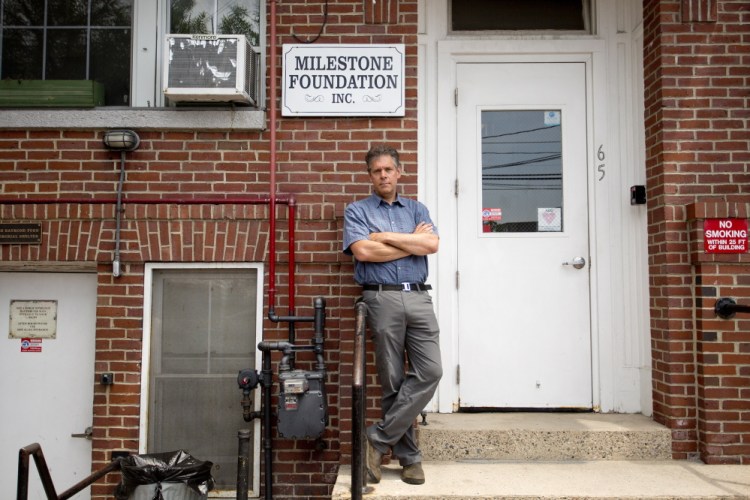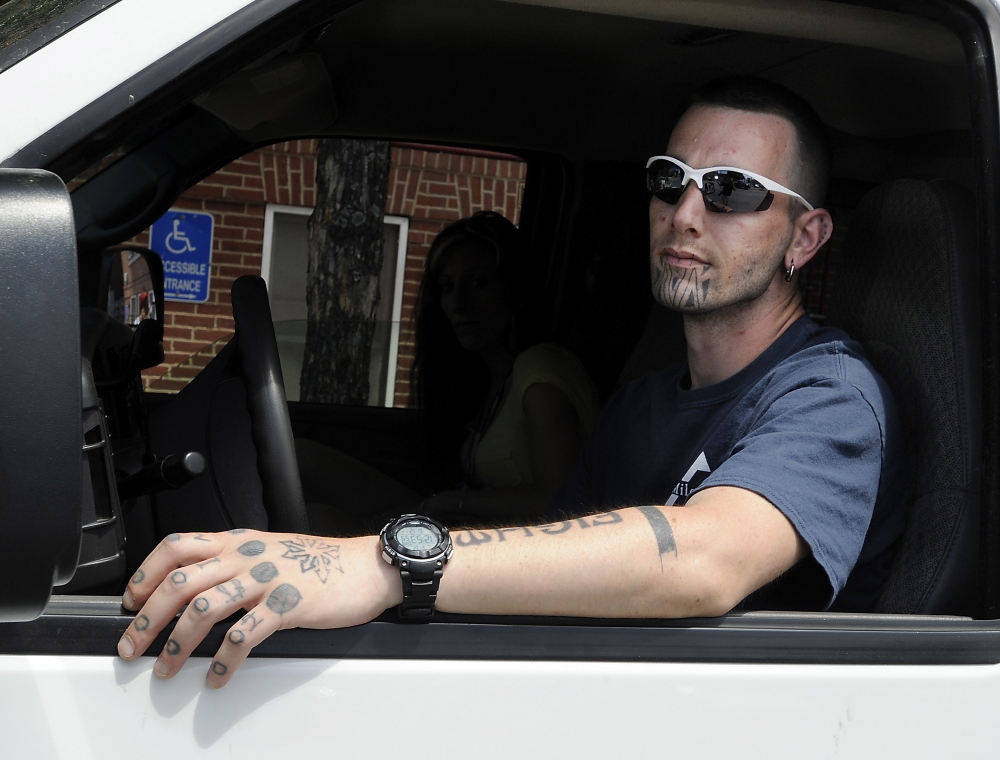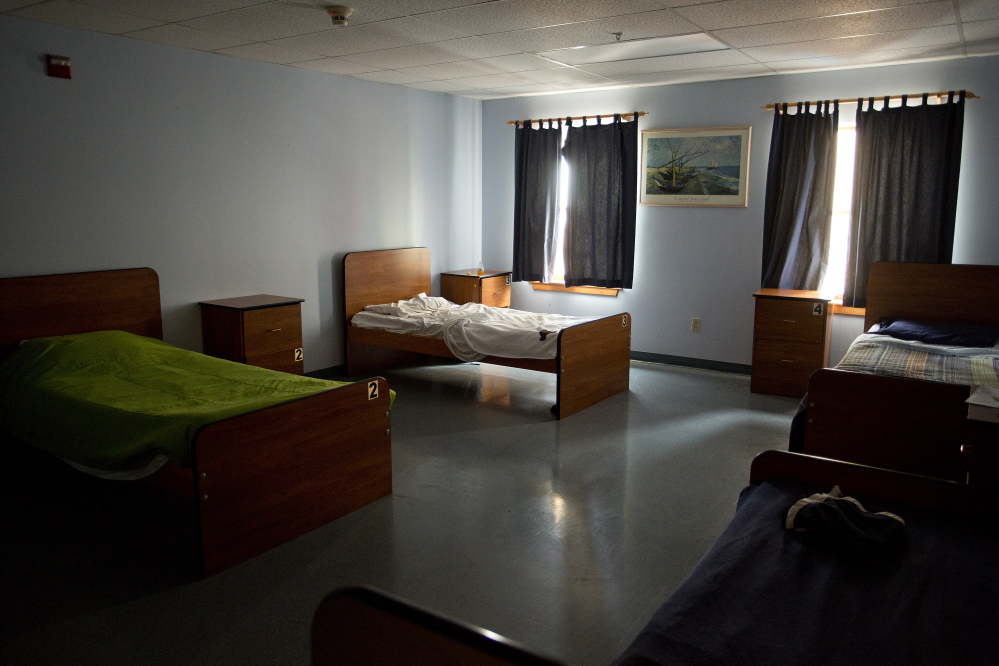Liam O’Reilly cycled through the detoxification clinic at Milestone Foundation at least 20 times over the past several years, but after a few days he always found himself back on the street again, shooting heroin.
Because he didn’t qualify for MaineCare, was uninsured and could not afford to pay out of pocket, O’Reilly, 32, couldn’t get into any of the longer-term treatment programs that might have given him a realistic chance of kicking his drug habit.
“I didn’t want to live without hope anymore. But I didn’t have any options,” he said. Finally, as he was contemplating suicide, a bed designated for “charity care” cases opened up in Milestone’s long-term treatment center in Old Orchard Beach, and he was able to get clean, he said. Only one of the 16 beds in the program is reserved for charity cases – the rest are given to MaineCare patients.
His experience reflects a gaping hole in the substance-abuse treatment system that health-care advocates say is only widening as thousands are dropped from MaineCare, the state’s version of Medicaid, which is often the only way low-income addicts can qualify for a 30-day or longer outpatient treatment program. With fewer people on MaineCare, the number of people caught in the revolving door of short-term detoxification and relapsed drug use increases.
The MaineCare cuts have also battered the treatment programs themselves, forcing them to pursue other funding sources to make up the lost revenue. Some programs have been forced to turn away uninsured addicts, and one, the Mercy Recovery Center in Westbrook operated by Mercy Hospital, announced last month that it would close in August, partly because fewer of its patients were covered by MaineCare.
The treatment system is straining at a time that heroin has become more potent and dangerous because it’s often laced with other drugs, according to Shannon Trainor, executive director of Crossroads Maine, a Scarborough-based treatment program.
The number of people seeking treatment for heroin use in Maine more than tripled from 1,115 in 2010 to 3,463 in 2014, according to state data. Heroin overdose deaths increased from seven in 2011 to 57 in 2014.
Treatment center advocates say that without addressing access barriers for low-income residents who don’t have MaineCare, the state is setting itself up for more overdose deaths and an increase in untreated substance abuse.
“There’s a pocket of people that’s not being served, and they’re not going away,” Trainor said.
ABSENCE OF ACCESS
The Maine Department of Health and Human Services said it is actually spending more on substance abuse – $77 million in the current fiscal year compared to $75 million two years ago – as part of a shift away from specialized clinics and toward treatment by primary care doctors.
DHHS Commissioner Mary Mayhew said the emphasis on primary care will give addicts access to more health services, improve efficiency and eliminate needless duplication of services.
“We need to support policies and payments, especially in mental health and substance-abuse services, that promote cost effective services and improved outcomes,” Mayhew said in a statement.
The number of people enrolled in MaineCare has declined from 355,000 to 287,000 since Gov. Paul LePage took office because of tightened eligibility requirements. A round of cuts in January 2014 alone removed 27,000 childless adults who earned above a certain income threshold.
The costs to taxpayers – for substance abuse and other MaineCare services – would have exploded had Maine not trimmed its MaineCare enrollment, state officials have said repeatedly.
But cutting MaineCare costs decreases access to services and could potentially increase other health care expenses, such as hospitalizations for overdoses, treatment center officials say.
Access to treatment is almost nonexistent for those who don’t qualify for MaineCare or have other financial means, said Bob Fowler, executive director at the Milestone Foundation, a substance-abuse treatment center in Portland. Fowler said MaineCare reimbursement for treatment at Milestone has dropped two-thirds since 2007, from $1.8 million to $650,000. The number of MaineCare patients Milestone serves has also probably declined by a similar percentage, although Milestone doesn’t track patient populations that way, Fowler said.
“We refer them to wherever we can, but a lot of times, it’s nothing,” Fowler said. “They won’t take patients unless they have good insurance, can pay out-of-pocket or have MaineCare.”
Milestone serves about 1,000 patients per year at its detox center, and now hundreds fewer have MaineCare so they are less likely to get long-term treatment.
“It’s awful. It’s incredibly frustrating,” said Lauren Wert, nurse manager at Milestone. “I want them to stay safe and sober, but if they’re out on the streets, they’re returning right back into that lifestyle.”
A detox center like Milestone’s offers short stays so patients can safely withdraw from drugs – typically three to seven days. Separate, longer-term programs can last for 30 days or longer and include counseling and often treatment with drugs like Suboxone, which helps reduce cravings for heroin and other opiates.
Milestone could limit the number of uninsured patients at its detox center, which would improve its financial picture, but doing so would go against the nonprofit’s mission of being a “last resort” safety net, Fowler said.
FUNDING GETS CREATIVE
Crossroads, Milestone and Catholic Charities treatment programs all report substantial decreases in the number of MaineCare patients, and say that has put pressure on their budgets.
Milestone has filled the gaps by raising more money privately and by more aggressively collecting from privately insured patients. So even though it’s lost $1.2 million in MaineCare funding, its $3 million budget is about the same as 2007 because of the other funding sources.
Crossroads and Catholic Charities have also successfully tapped into other revenue streams despite losing 40 percent or more of their MaineCare revenue. Catholic Charities now provides substance-abuse services for prisoners and those on probation to increase revenue, officials said.
Mayhew, the DHHS commissioner, said health-care providers must learn how to become less reliant on government funding. State DHHS officials said when treatment programs seek other sources of funding, taxpayer dollars stretch further while still providing needed services.
“Medicaid is the predominant payer of these services in Maine and nationally. Unfortunately that has created a dependency by many providers on Medicaid and less pressure to explore other financial resources to support the delivery of these services,” she said in a statement.
Trainor, at Crossroads, said despite finding some ways to fill the funding gaps, the program had to eliminate two positions and give employees unpaid days off to stay afloat.
“If I served many uninsured clients, we wouldn’t be in business at all,” Trainor said.
The Mercy Recovery Center will lay off about 45 employees when it fully closes by the end of August. The program served about 250 clients, and Mercy Hospital is referring former patients to outpatient treatment centers and bringing in addiction specialists to its network of primary care offices. The LePage administration is trying to shift substance-abuse treatment to primary-care settings whenever possible, because state officials believe it improves efficiency and treats the patient’s overall health and not just the substance abuse.
Mercy Hospital Vice President Melissa Skahan said the number of MaineCare patients treated at the Recovery Center had declined by 56 percent since 2012.
“Absolutely, it was one of many factors,” Skahan said of the decision to shutter the program. “We had to adapt to respond to the situation.”
O’Reilly knows there are few options for people facing the problems he suffered through. Although he was helped, many aren’t, and he’s lucky he didn’t die from an overdose or suicide, he said.
Instead, he’s been sober for a year, holds down a full-time job as an outreach worker with Milestone Foundation, has health insurance and is no longer homeless.
“I am finally a productive member of society,” he said.
Send questions/comments to the editors.






Success. Please wait for the page to reload. If the page does not reload within 5 seconds, please refresh the page.
Enter your email and password to access comments.
Hi, to comment on stories you must . This profile is in addition to your subscription and website login.
Already have a commenting profile? .
Invalid username/password.
Please check your email to confirm and complete your registration.
Only subscribers are eligible to post comments. Please subscribe or login first for digital access. Here’s why.
Use the form below to reset your password. When you've submitted your account email, we will send an email with a reset code.